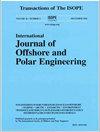机器学习船舶离地速度预测模型及航行时间控制策略
IF 0.6
4区 工程技术
Q4 ENGINEERING, CIVIL
International Journal of Offshore and Polar Engineering
Pub Date : 2022-12-01
DOI:10.17736/ijope.2022.jc876
引用次数: 0
摘要
本文提出了一种基于机器学习的船舶速度预测模型,该模型由极限梯度提升(XGBoost)算法驱动。该数据集是从一艘环球航行的化学品油轮上获得的,该油轮进行了五年的全面测量。该模型使用遇到的海洋环境和船舶运行概况在两种情况下进行训练:通过螺旋桨每分钟转数(RPM)或推进功率。该模型进一步与粒子群优化算法相结合,集成了一种航行时间控制方法。它优化恒定转速或功率运行策略,以满足固定估计到达时间的要求。本文章由计算机程序翻译,如有差异,请以英文原文为准。
A Machine Learning Ship’s Speed Over Ground Prediction Model and Sailing Time Control Strategy
This paper proposes a machine learning–based ship speed over a ground prediction model, driven by the eXtreme Gradient Boosting (XGBoost) algorithm. The data set is acquired from a world-sailing chemical tanker with five years of full-scale measurements. The model is trained using encountered metocean environments and ship operation profiles in two scenarios: through propeller revolutions per minute (RPM) or propulsion power. This model is further combined with the particle swarm optimization algorithm to integrate a sailing time control method. It optimizes constant RPM or power operation strategy to meet the requirements of a fixed estimated time of arrival.
求助全文
通过发布文献求助,成功后即可免费获取论文全文。
去求助
来源期刊

International Journal of Offshore and Polar Engineering
ENGINEERING, CIVIL-ENGINEERING, OCEAN
CiteScore
2.00
自引率
0.00%
发文量
44
审稿时长
>12 weeks
期刊介绍:
The primary aim of the IJOPE is to serve engineers and researchers worldwide by disseminating technical information of permanent interest in the fields of offshore, ocean, polar energy/resources and materials engineering. The IJOPE is the principal periodical of The International Society of Offshore and Polar Engineers (ISOPE), which is very active in the dissemination of technical information and organization of symposia and conferences in these fields throughout the world.
Theoretical, experimental and engineering research papers are welcome. Brief reports of research results or outstanding engineering achievements of likely interest to readers will be published in the Technical Notes format.
 求助内容:
求助内容: 应助结果提醒方式:
应助结果提醒方式:


